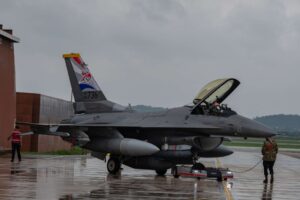Germany’s interior minister has warned of new efforts by Moscow to sway public opinion. What is “hybrid warfare” — and how to counter it?
The threat of Russia using cyberattacks, propaganda and other tactics to influence public opinion in Germany is real and growing, according to the country’s interior minister.
“The dangers have reached a new level,” Nancy Faeser of the center-left Social Democrats told the Süddeutsche Zeitung newspaper.
Her warning comes as Germany prepares for the European Parliament elections in June and three regional elections in September. There are growing concerns that Russia will try to rally support for pro-Kremlin parties such as the far-right populist Alternative for Germany (AfD) ahead of the votes. The country has long been a target of Russian influence operations. Since the start of Russia’s full-scale invasion of Ukraine in 2022, many of these have been aimed at undermining support for Ukraine.
“Now, it’s about showing determination and strength in the face of this, and exposing how the other side is operating,” said Rüdiger von Fritsch, a former German ambassador to Moscow and the former vice-president of the BND, the German foreign intelligence service.
What is hybrid warfare?
The term “hybrid warfare” describes a complex strategy that combines military tools with unconventional methods ranging from increasing economic pressure to spreading propaganda.
It is not a new phenomenon. For centuries, countries have used non-military means to influence public opinion abroad.

But over the past two decades, the rise of the internet and social media platforms has given them a whole new arsenal of online weapons: In what are known as “hack-and-leak” operations, hackers gain access to sensitive or confidential information and then strategically release it to the public. Cyberattacks can also be used to bring down a country’s critical infrastructure, including the machines and software used in elections. At the same time, social media platforms are being used to spread fabricated or misleading information.
“The digital world is a dream come true for intelligence services,” von Fritsch told DW.
How does this type of warfare work?
Hybrid warfare is often described as a form of “shadow warfare” that takes place outside the public eye and is never officially declared.
“The concept of hybrid warfare is that initially, you don’t notice it happening,” Leslie Schübel, a Russia expert at the Hamburg-based Körber Foundation, told DW.

In January, the German government said it had uncovered a coordinated Russian disinformation campaign on X, formerly Twitter. Before it was shut down, the campaign had distributed more than a million messages through fake accounts, pushing false or misleading narratives, such as that aid to war-torn Ukraine was neglecting local citizens.
By spreading such messages in large numbers on online platforms, Russia aims to maximize its visibility and foster a sense of legitimacy. The goal, experts say, is to widen social divides, fuel anger, and sow distrust in democratic processes and the media.
“For Russia, spreading doubt is already a success,” Schübel said.
The effects of the ‘Taurus leak’
While most forms of hybrid warfare remain in the shadows, some operations are deliberately made public.
In early March, the head of Russian state broadcaster RT published a confidential conversation between senior German military officials. The breach, known as the “Taurus leak,” embarrassed the German military and caused a diplomatic uproar.
“But the affair also serves Putin domestically,” said Maria Sannikova-Franck, who heads the Russia program at the Berlin-based think tank Zentrum Liberale Moderne.
In the conversation, the officials were heard debating possible scenarios for Russia’s war in Ukraine. After its release, Russian media claimed that the tape revealed that Germany’s army was discussing substantial and specific plans to attack Russian territory.
“The image [Putin] wants to create is that Germany and the West are threatening Russia, and he has done that very successfully,” Sannikova-Franck told DW. “He also successfully deflected attention from the death and funeral of Alexei Navalny.”
Navalny, who was one of Putin’s most outspoken domestic opponents, died in mid-February at the age of 47 in an Arctic penal colony. He was buried on March 1, the same day the German military conversation was made public.
How to fight back
A multi-pronged approach is needed to counter hybrid warfare, experts agree.
Countries must ensure that their critical infrastructure, including voting technology, is adequately protected against cyberattacks.
The “Taurus leak,” which, it turned out, happened because a participant joined through an unsecured connection, also underscores the need to raise cybersecurity awareness across all sectors of society.
And experts stress the importance of educating citizens about disinformation tactics and how any information they encounter online could be intentionally designed to deceive and manipulate them.
“It is important to reveal the mechanisms of this propaganda ― how it works, how it affects us, how it affects opinion,” Sannikova-Franck said.
Source: DW
















